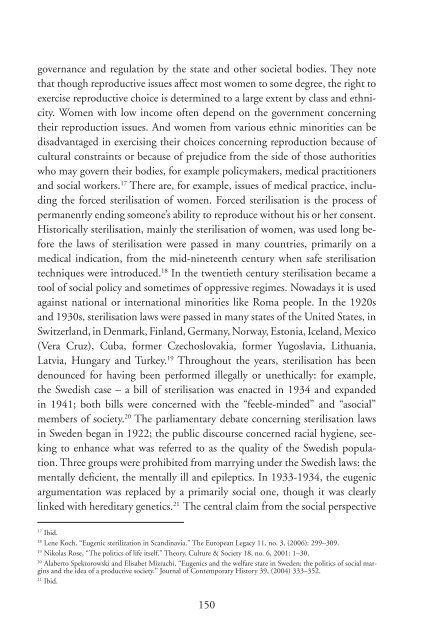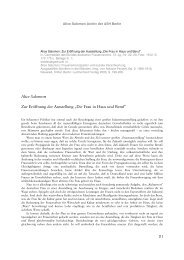Teaching Gender in Social Work - MailChimp
Teaching Gender in Social Work - MailChimp
Teaching Gender in Social Work - MailChimp
Create successful ePaper yourself
Turn your PDF publications into a flip-book with our unique Google optimized e-Paper software.
governance and regulation by the state and other societal bodies. They note<br />
that though reproductive issues affect most women to some degree, the right to<br />
exercise reproductive choice is determ<strong>in</strong>ed to a large extent by class and ethnicity.<br />
Women with low <strong>in</strong>come often depend on the government concern<strong>in</strong>g<br />
their reproduction issues. And women from various ethnic m<strong>in</strong>orities can be<br />
disadvantaged <strong>in</strong> exercis<strong>in</strong>g their choices concern<strong>in</strong>g reproduction because of<br />
cultural constra<strong>in</strong>ts or because of prejudice from the side of those authorities<br />
who may govern their bodies, for example policymakers, medical practitioners<br />
and social workers. 17 There are, for example, issues of medical practice, <strong>in</strong>clud<strong>in</strong>g<br />
the forced sterilisation of women. Forced sterilisation is the process of<br />
permanently end<strong>in</strong>g someone’s ability to reproduce without his or her consent.<br />
Historically sterilisation, ma<strong>in</strong>ly the sterilisation of women, was used long before<br />
the laws of sterilisation were passed <strong>in</strong> many countries, primarily on a<br />
medical <strong>in</strong>dication, from the mid-n<strong>in</strong>eteenth century when safe sterilisation<br />
techniques were <strong>in</strong>troduced. 18 In the twentieth century sterilisation became a<br />
tool of social policy and sometimes of oppressive regimes. Nowadays it is used<br />
aga<strong>in</strong>st national or <strong>in</strong>ternational m<strong>in</strong>orities like Roma people. In the 1920s<br />
and 1930s, sterilisation laws were passed <strong>in</strong> many states of the United States, <strong>in</strong><br />
Switzerland, <strong>in</strong> Denmark, F<strong>in</strong>land, Germany, Norway, Estonia, I celand, Mexico<br />
(Vera Cruz), Cuba, former Czechoslovakia, former Yugoslavia, Lithuania,<br />
Latvia, Hungary and Turkey. 19 Throughout the years, sterilisation has been<br />
denounced for hav<strong>in</strong>g been performed illegally or unethically: for example,<br />
the Swedish case – a bill of sterilisation was enacted <strong>in</strong> 1934 and expanded<br />
<strong>in</strong> 1941; both bills were concerned with the “feeble-m<strong>in</strong>ded” and “asocial”<br />
members of society. 20 The parliamentary debate concern<strong>in</strong>g sterilisation laws<br />
<strong>in</strong> Sweden began <strong>in</strong> 1922; the public discourse concerned racial hygiene, seek<strong>in</strong>g<br />
to enhance what was referred to as the quality of the Swedish population.<br />
Three groups were prohibited from marry<strong>in</strong>g under the Swedish laws: the<br />
mentally deficient, the mentally ill and epileptics. In 1933-1934, the eugenic<br />
argumentation was replaced by a primarily social one, though it was clearly<br />
l<strong>in</strong>ked with hereditary genetics. 21 The central claim from the social perspective<br />
17<br />
Ibid.<br />
18<br />
Lene Koch, “Eugenic sterilization <strong>in</strong> Scand<strong>in</strong>avia.” The European Legacy 11, no. 3, (2006): 299–309.<br />
19<br />
Nikolas Rose, “The politics of life itself.” Theory, Culture & Society 18, no. 6, 2001: 1–30.<br />
20<br />
Alaberto Spektorowski and Elisabet Mizrachi. “Eugenics and the welfare state <strong>in</strong> Sweden: the politics of social marg<strong>in</strong>s<br />
and the idea of a productive society.” Journal of Contemporary History 39, (2004) 333–352.<br />
21<br />
Ibid.<br />
150














